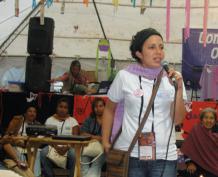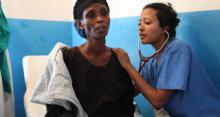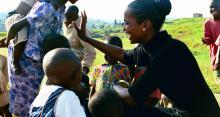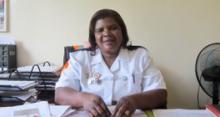HERO: Marusia Lopez Cruz
Heroes
Exclusive one-on-one interviews with extraordinary individuals working on behalf of women, children, and families worldwide.

HER DREAM
“I hope that violence is eradicated - the violence in today’s world restricts thousands of women’s freedom, lives, and integrity. I also hope that, in order to construct a violence-free society, motherhood becomes a joyful, pleasant experience in which childcare is the responsibility of the entire community.”
WHY SHE’S A HERO:
Marusia is the Mexico advisor for the Global Fund for Women and the Mesoamerica regional coordinator at JASS (Just Associates), an international feminist organization that is dedicated to strengthening and mobilizing women’s voices, visibility, and collective organizing power to change norms, institutions, and policies that perpetuate inequality and violence.
AN INTERVIEW WITH HERO MARUSIA LOPEZ CRUZ
IMOW: How did you first get involved with human rights work?
My mother and father, Margarita and Anthar, were political activists in Mexico. They supported a number of social movements through the “Trova,” a musical movement that reacted to the war of the 1970’s. My parents brought my sisters, my brother, and me to the demonstrations, strikes, and other acts of resistance and social struggle. This experience helped me create my own perspective of society, become more conscious about inequality, and understand the strength that people have when they decide to fight for their rights.
When I was seventeen, I saw an announcement at school for volunteers for a community service organization that worked in the indigenous territories of southern Mexico. In the month that I worked there, I learned about the deep wounds that violence and poverty left in these communities, and I was horrified by what I saw. Getting to know women and communities affected by such violence and poverty influences me to this day. So, my involvement with human rights work is motivated by both my family and my community service experience.
IMOW: How do you manage to find a balance between your working life as a political activist and your personal life as mother?
It’s not easy, nor does it depend entirely on me. To start with, I am lucky to work at JASS, a feminist organization that advocates for labor dynamics founded upon respect. To be a mother in this type of working environment makes me feel supported and valued in my decision to be a mother.
However, we live in a society that tries to fragment our lives and that prioritizes production over personal well-being. Every day is a constant struggle to have enough time to catch up with my work and take political action and, at the same time, care for my child and spend time with him. I will admit that on many occasions I have been overwhelmed, tired and exhausted, feeling guilty and anxious for not being able to do it all.
My partner Pere has assumed responsibility for childcare, which has also allowed me to be a working mother. When we decided to have a child, we thought that the best option would be for one of us to stay at home for the first few years. This experience has been very gratifying and has led us to believe that gender roles can be overcome through confronting our own gender stereotypes.
IMOW: How do you think your experience as a mother has influenced or helped your work develop?
Being a feminist mother has very much impacted my career. Never before had I been so conscious of what caring for another life entails—all of the creativity and energy it requires, of the enormous learning experience that it offers us. Watching a new being learn to walk, understand language in all of its complexities, and learn to love and be free is something truly beautiful and inspiring.
I feel that this experience has contributed a lot to the work that I do to construct a better society. From all the energy, creativity, and wonder that I have gained as a mother, I am more certain of how important it is for a society to prioritize childcare and make us responsible for the well-being of everyone in our community.
IMOW: Are all mothers activists?
Yes and no. I think that in order for a person to survive, they must have a mother or mother figure to spoil them with a special kind of maternal love. To give this love – to assure a person that they will survive despite arriving in the world defenseless, in a society marked by violence, corruption, control and exploitation – means that mothers must recognize the social norms that threaten their children’s security. This is often the start of activism. This doesn’t mean that all mothers are conscious of this experience, or that they will automatically become aware of their rights that allow them to get involved in the struggle to change the world. However, it’s true that motherhood has been a motivator for many mothers to fight for human rights, for justice, for the rights for their children, and, for their own rights.
IMOW: What change have you accomplished that you feel most proud of?
One experience that makes me feel especially proud was when we contributed to the liberation of a group of political prisoners who were a part of the peasant movement in San Salvador Atenco, Mexico. Our work consisted of giving international visibility to the peasant women’s leadership in this struggle, and supporting them and their unjustly captured partners. We also built a network between these women and people like Nobel Peace Laureate Jody Williams, and this visibility raised international demand for Mexico to stop violating the rights of its people. The result was the liberation of the political prisoners – a national precedent of what women can accomplish through force of solidarity between them, their organizations, and their movements.
IMOW: Can men and sons be a part of the solution in the movement and fight against violence against women?
Absolutely! We live in an environment that exalts and legitimizes machismo and misogyny. As a result, the majority of men do little to change the situation. Even so, it seems important to me that we must spearhead new ways of relating to one another, and invite men to participate in our struggles. I hope that my son will grow up in a non-discriminatory environment where his father and I construct a relationship based on respect and equality.
IMOW: What is the most important lesson you learned from your mother?
My mother was the first feminist I ever met, even though she was not involved in any feminist movement or organization. She taught me the value of autonomy and of defending autonomy even when society doesn’t agree with it. I also learned the strength of love in encouraging trust. My mother has supported each and every one of my decisions and trusts that I will find my own path to confront adversity. In a world that disapproves of women who decide to be free and break gender roles, this trust and love has been crucial for me.
IMOW: How can the members of IMOW help you with your work?
These days in Mesoamerica (Mexico and Central America), human rights activists are facing an increase in threats and attacks. In Mexico alone, 16 activists and journalists were assassinated between 2010 and 2011.
Human rights activists are those who search for victims of forced exile, those who uncover cases of sexual violence committed by the military, those who mobilize in defense of indigenous territory and natural resources and those who protect workers in the factories. However, their contributions and leadership are not recognized and many of these are not recognized as human rights activists. This in itself increases the risk to them and leaves them without adequate protection from covert forms of violence. Just by being women, we are the most vulnerable to sexual violence, slanderous campaigns, and the need to leave our homes in order to protect ourselves and our families. When an activist is assaulted, it is probable that she will leave her human rights work in order to protect her family.
Organization like the Global Fund for Women and the Mesoamerican Women’s Rights Defenders Initiative are spearheading projects to protect and recognize human rights activists who are at risk. I think that IMOW can contribute enormously to these efforts in promoting public recognition of the activists who are facing risky and violent situations.
IMOW: What is something most people don’t know about you?
I like to dance salsa and baile son cubano – and I’m not bad, either!
IMOW: Why are you a feminist?
Because I believe that it is with feminism that we can challenge discrimination, inequality and violence. The patriarchal system is eradicated only when it is possible to construct a new society. Feminism is a personal and collective option in order to understand how to be free and to construct respectful relationships and reciprocity with people from all over the world.
Take Action
Support Marusia's work by learning more or donating to JASS or the Global Fund for Women!
Related Content
|
Dr. Rahel Nardos is improving maternal health in Ethiopia one woman at a time, by training Ethiopian doctors and midwives in life-saving obstetric procedures and preventative maternal health. |
Joan Blades, author and founder of MomsRising.org, advocates for healthy business policies for mothers, and creating a system that supports parents in the modern workforce. |
Marie Claudine Mukamabano is the founder and CEO of Kuki Ndiho Rwanda Orphans Support Project, an NGO dedicated to the healing of the lives of the thousands of orphans living in Rwanda today. |
Rhoda Amafumba, a midwife and nurse for more than 25 years in Lusaka, Zambia, trains midwifes in use of the LifeWrap, a groundbreaking first-aid device that saves mothers’ lives. |





